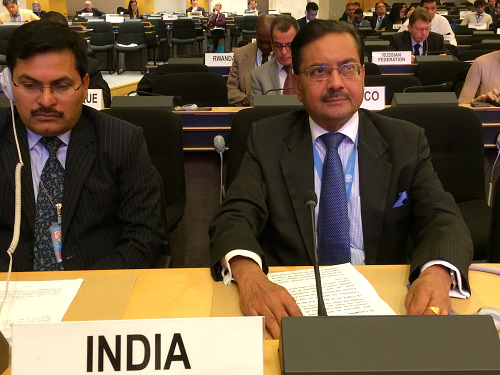Permanent Mission of India
Geneva
*****
Statement by H.E. Mr. Ajit Kumar, Ambassador & Permanent Representative of India to UN & other International Organizations
67th Session of Executive Committee of the United Nations High Commissioner for Refugees
Geneva, 3-7October 2016

Mr. Chair,
India appreciates the forward looking opening statement of the High Commissioner Mr. Filippo Grandi and thanks him for proposing a path breaking and refugee centric, strategic direction to the UNHCR. We are happy to note that the High Commissioner has agreed to our long standing demand to shift focus towards the interest of affected people and work towards strengthening the capability of host states, primarily the developing countries which are otherwise unduly burdened by this crisis.
We strongly believe that for effectively addressing the present day unprecedented challenge, UNHCR requires new approaches beyond the traditional humanitarian models. This includes assisting fragile situations through delivery of services, child protection, legal and psychological aid, preventing and responding to sexual and gender-based violence, and addressing the concerns of people with disabilities, and others with specific needs.
Particularly in fragile situations, we recommend UNHCR to provide holistic solution to affected population including technical support, engaging in sectors such as health, shelter, education and livelihoods etc. This should continue till the specialised agencies; national or local actors takes over these mandates.
We recommend higher allocation of resources and manpower to strengthen UNHCR's campaign to end statelessness.
Mr. Chair,
We are happy to note that a new concessional lending instrument developed by the World Bank and the UN has started playing an important role in leveraging development support to Syrian refugees and host countries and communities in the Middle East. We welcome the new global lending facility launched recently in New York, and designed to extend concessional financing arrangements to middle income countries hosting disproportionally large refugee populations. This was one of the long-standing demands of the developing countries.
India supports UNHCR's efforts to further leverage strengths and comparative advantages of UN agencies, partnerships with local and national players for smooth and effective implementation of its programmes. We urge UNHCR to identify, strengthen and work with national and local responders at much larger scale to ensure localisation of solution and ownership of the whole process by the affected people and the host community.
The High Commissioner's decision to deepen engagement with IOM, the lead migration agency which has recently got related organisation status of UN, is indeed praiseworthy.
Mr. Chair,
We note with satisfaction that under "Grand Bargain" commitments, UNHCR has decided to significantly scale up cash based interventions, pursue greater efficiencies, enter in relationship agreement with other agencies in needs assessments, harmonising and simplifying of reporting requirements, and in reducing procurement and logistics costs, and to minimise the volume of prescriptive guidelines issued for field offices.
India is happy to note that UNHCR has embarked upon a path of strengthening the internal capacities and systems to pursue the core directions through bringing reforms, simplification of procedures and processes and adoption of other management tools, while ensuring highest standards of accountability.
India and several developing countries proposed these ideas in Standing Committee discussions. We believe, sincere efforts to implement these initiatives have potential to transform UNHCR's impact on the lives of refugees and bring greater value to the scare resources at our disposal.
In order to further strengthen its protection solutions, we would urge UNHCR to pursue creativity and innovation, adopt new technologies, and ideas which may bring meaningful impact on the life of the refugees.
I take this opportunity to renew India's commitment on protection of refugees and cooperation with UNHCR in discharging its core mandate and responsibilities.
Thank you, Mr. Chair.
******












